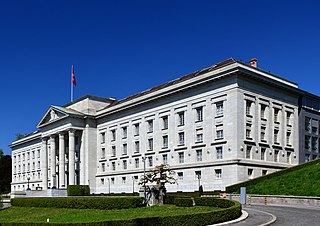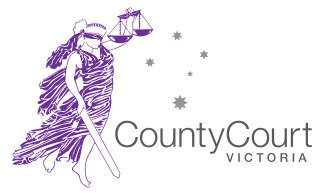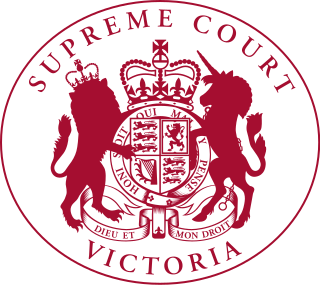The following is a list of courts and tribunals in Victoria:
The following is a list of courts and tribunals in Victoria:
The courts of England and Wales, supported administratively by His Majesty's Courts and Tribunals Service, are the civil and criminal courts responsible for the administration of justice in England and Wales.

The Federal Supreme Court of Switzerland is the supreme court of the Swiss Confederation and at the head of the Swiss judiciary.
The court system of Canada forms the country's judiciary, formally known as "The King on the Bench", which interprets the law and is made up of many courts differing in levels of legal superiority and separated by jurisdiction. Some of the courts are federal in nature, while others are provincial or territorial.

The Supreme Court of British Columbia is the superior trial court for the province of British Columbia, Canada. The Court hears civil and criminal law cases as well as appeals from the Provincial Court of British Columbia. There are 90 judicial positions on the Court in addition to supernumerary judges, making for a grand total of 108 judges. There are also 13 Supreme Court masters who hear and dispose of a wide variety of applications in chambers.
The judiciary of Australia comprises judges who sit in federal courts and courts of the States and Territories of Australia. The High Court of Australia sits at the apex of the Australian court hierarchy as the ultimate court of appeal on matters of both federal and State law.

The Supreme Court of South Australia is the superior court of the Australian state of South Australia. The Supreme Court is the highest South Australian court in the Australian court hierarchy. It has unlimited jurisdiction within the state in civil matters, and hears the most serious criminal matters. The Court is composed of a Chief Justice and as many other judges as may be required.
The courts of Northern Ireland are the civil and criminal courts responsible for the administration of justice in Northern Ireland: they are constituted and governed by the law of Northern Ireland.

The County Court of Victoria is the intermediate court in the Australian state of Victoria. It is equivalent to district courts in the other states.

Sir Kenneth James Keith is a New Zealand judge. He was elected to the International Court of Justice in November 2005, serving a nine-year term during the years 2006 through 2015.

In most legal jurisdictions, a supreme court is the highest court within the hierarchy of courts. Other descriptions for such courts include court of last resort, apex court, and highcourt of appeal. Broadly speaking, the decisions of a supreme court are not subject to further review by any other court. Supreme courts typically function primarily as appellate courts, hearing appeals from decisions of lower trial courts, or from intermediate-level appellate courts.

The Supreme Court of Victoria is the highest court in the Australian state of Victoria. Founded in 1852, it is a superior court of common law and equity, with unlimited and inherent jurisdiction within the state.

The judiciaries of the United Kingdom are the separate judiciaries of the three legal systems in England and Wales, Northern Ireland and Scotland. The judges of the Supreme Court of the United Kingdom, the Special Immigration Appeals Commission, Employment Tribunals, Employment Appeal Tribunal and the UK tribunals system do have a United Kingdom–wide jurisdiction but judgments only apply directly to the jurisdiction from which a case originates as the same case points and principles do not inevitably apply in the other jurisdictions. In employment law, employment tribunals and the Employment Appeal Tribunal have jurisdiction in the whole of Great Britain.
The Victorian Civil and Administrative Tribunal (VCAT) was formed by the Victorian Civil and Administrative Tribunal Act 1998 in the state of Victoria, Australia. As part of the Victorian Justice system the Tribunal sits 'below' the Magistrates Court in the court hierarchy. However the Tribunal itself is not a court, not possessing any jurisdiction or powers beyond those conferred by statute. VCAT was primarily a forum for litigants-in-person and the participation of lawyers or other legal representatives is not encouraged in some List areas, substantially reducing the cost of litigation. However some of the List areas will by necessity require parties to have some form of representation.

The Supreme Court is the highest court in the Kingdom of Spain. Originally established pursuant to Title V of the Constitution of 1812 to replace —in all matters that affected justice— the System of Councils, and currently regulated by Title VI of the Constitution of 1978, it has original jurisdiction over cases against high-ranking officials of the Kingdom and over cases regarding illegalization of political parties. It also has ultimate appellate jurisdiction over all cases. The Court has the power of judicial review, except for the judicial revision on constitutional matters, reserved to the Constitutional Court.

The New South Wales Court of Appeal, part of the Supreme Court of New South Wales, is the highest court for civil matters and has appellate jurisdiction in the Australian state of New South Wales.
Elizabeth Helen Curtain is a retired judge, serving successively on the benches of the County Court of Victoria and the Supreme Court of Victoria, in the Australian state of Victoria, and currently Chair of the Adult Parole Board of Victoria.
The Judiciary of Sri Lanka are the civil and criminal courts responsible for the administration of justice in Sri Lanka. The Constitution of Sri Lanka defines courts as independent institutions within the traditional framework of checks and balances. They apply Sri Lankan Law which is an amalgam of English common law, Roman-Dutch civil law and Customary Law; and are established under the Judicature Act No 02 of 1978 of the Parliament of Sri Lanka.

The National Company Law Tribunal is a quasi-judicial body in India that adjudicates issues relating to Indian companies. The tribunal was established under the Companies Act 2013 and was constituted on 1 June 2016 by the government of India and is based on the recommendation of the V. Balakrishna Eradi committee on law relating to the insolvency and the winding up of companies.

The law of Cyprus is a legal system which applies within the Republic of Cyprus. Although Cypriot law is extensively codified, it is still heavily based on English common law in the sense that the fundamental principle of precedent applies.

The Judiciary of Bangladesh or Judicial system of Bangladesh is based on the Constitution and the laws are enacted by the legislature and interpreted by the higher courts. Bangladesh Supreme Court is the highest court of Bangladesh. The jurisdiction of the Supreme Court of Bangladesh has been described in Article 94(1) of the Constitution of Bangladesh. It consists of two divisions, the High Court Division and the Appellate Division. These two divisions of the Supreme Court have separate jurisdictions.